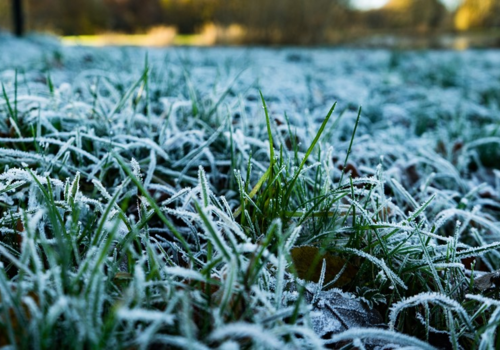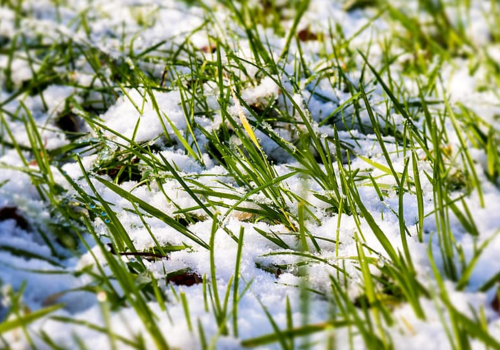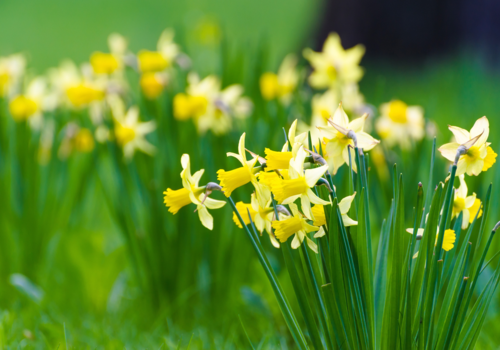
February is part of the low season for lawns, but that doesn't mean there's no maintenance work to do if you want great looking, healthy grass all year round. In part two of our lawn care calendar, we cover our top tips for February lawn maintenance.
February Lawn Care
Just like in our January lawn care post, it's preferable to keep off the grass as much as you can in February to avoid compacting the soil. Throughout the whole winter, it's important to keep your lawn free of debris and leaves which could starve the grass of light and weaken it. These are the basic tasks you should be carrying out to care for your grass in February, but what if you'd like to do some extra lawn maintenance tasks?
February Lawn Care: Dos and Don'ts
Do:
- Plan tasks according to the weather
- Keep a close eye on the health of your lawn
- Cut the grass if it's growing and apply autumn/winter fertiliser (including lawn edges)
- Aerate and try to reduce any sitting water
- Continue to remove debris and leaves
- Brush away worm casts that have built up over the winter before mowing
- Apply grass seed to bare patches if the conditions are right
Don't:
- Be concerned if your grass / repair grass seed isn’t growing, it might need slightly warmer conditions to grow
- Mow the lawn if the weather is very cold and growth is slow
- Carry out intensive scarification
- Cut grass too short
What should I do to my lawn in February?
During February, you should focus on things that will improve the quality of your grass when it starts to grow again in spring.
If you want to smarten up your lawn, you can cut in the lawn edges during February. This will create a much tidier appearance during the winter and save you some time as the weather gets warmer.
Can you plant grass seed in February?
If the winter weather has left bald patches, you might be thinking of seeding your lawn in February. You can seed areas that need new growth during the winter, but the grass seed is unlikely to grow at this time of year. This isn't too much of a problem as the seeds will germinate as conditions improve in early spring. This is called dormant seeding.
Is February too early to cut grass?
No - if your grass looks like it needs a cut in February, and the ground is not too wet, then your lawn will benefit from a high cut. Although lawn growth will be slow at this time of year, a high cut will remove the top of the grass blades and encourage new, healthy growth.
Winter is also a good time to clean and service your lawn mower ready for it to work hard in the coming months. Clean the outside, underside and the mower blades (with care!). Check mower blades are sharp and look out for any dents. Tighten nuts and bolts if necessary. You can also book your lawnmower in for a service if it needs some extra TLC. Servicing your lawn mower in the winter months means that the spring cuts will be as kind to the grass as possible.
Can I fertilise the lawn in February?
Yes! If you've not fertilised since autumn, a winter feed is perfect in early February to replenish soil nutrients that have leached over the winter.
Towards the end of the month, why not order some spring lawn feed? Our lawn revivor and moss killer can be applied from late February through to September. This fast-acting lawn treatment will dramatically improve the appearance of your lawn with a fast 'green-up', and control moss at the same time. You'll love the deep green colour your grass takes on after this spring lawn feed.
Aerating the Lawn in February
Aerating the lawn with a garden fork is a good task for winter as it helps improve drainage and soil compaction. It can also help oxygen to circulate. Only carry out this job if the ground is dry enough and there is no frost.
Scarifying your lawn in the winter months is not recommended. The cold weather and frozen soil mean that carrying out this task could cause more damage to the lawn than good, so it's best avoided. It's best to remove thatch when the grass is in a healthy state of growth and can recover quickly.
Lawn Care Tips for February
Here are some tips for dealing with other winter problems and challenges:
- Worm Casts: As the soil is damp at this time of year you might notice casts as worms move through the surface of the soil. This is a good sign, as they help to cultivate and improve the soil. However, if casts are left to build up they can encourage weed growth, so you can keep on top of them by brushing back into the lawn when dry. This will help distribute nutrients in the soil too.
- Moss Problems: Keep an eye on winter moss, and schedule a treatment for late February or early March, along with a feed. Getting on top of moss in good time stops it from becoming a bigger problem.
- Weeds: Keep on top of weed removal during winter. Weeds won't be growing as fast as they do in spring and summer, so they will be easier to keep on top of and you'll have less work to do later in the year.
- Frost: Keep off the grass at frosty times, as stepping on it can cause damage. Try to reduce shady patches where possible as they will take a long time to thaw. Protect grass with windbreakers where possible as strong winds can cause extra damage to frozen grass.
- Lawn diseases: Cold, wet conditions can cause lawn diseases. Treat these as soon as possible, and plan your feeding schedule for spring, summer, and autumn to strengthen your lawn before next winter.
It might be cold, wet and dull, but a little February lawn care goes a long way and will set you up perfectly for March and the incoming spring weather!
If you're looking for some lawn care tips for the coming months, take a look at our next lawn care guides:
- March lawn care tips
- April lawn care tips
- May lawn care tips
- June lawn care tips
- July lawn care tips
How we can help!
At Boston Seeds we take pride in excellent customer service. If you need help with how to care for your lawn in the Winter months - we can help.
With Next Day Delivery on hundreds of items too, choosing from our extensive range of lawn seed couldn’t be easier. Ordering regularly or looking for large volumes? Click here to apply for a trade account today - we review all applications within one working day.
Have a question about best practice when it comes to growing your lawn from grass seed? Or unsure which grass seed is best for your needs? Get in touch with our friendly experts who’ll be happy to help.


